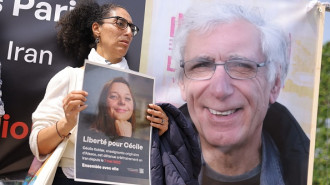Jordan's King Abdullah sees no Mideast peace without US role
Jordan's King Abdullah sees no Mideast peace without US role
King Abdullah of Jordan said there cannot be a Middle East peace process without the role of the US, saying America could be given the "benefit of the doubt".
2 min read
Abdullah said he would "reserve judgement" on Trump (Getty)
The United States remains essential to any hope of a peaceful solution between Israel and the Palestinians,
King Abdullah II of Jordan said on Sunday, despite widespread criticism of the new US stance on Jerusalem.
King Abdullah II of Jordan said on Sunday, despite widespread criticism of the new US stance on Jerusalem.
"We cannot have a peace process or a peace solution without the role of the United States," the monarch said on the CNN programme Fareed Zakaria GPS.
"This was true even after President Donald Trump decided to move the US embassy from Tel Aviv - where nearly every other country has its embassy - to Jerusalem," he said.
In December, Jordan had called Trump's move "a violation of decisions of international law and the United Nations charter," and Abdullah re-iterated his concerns to Vice President Mike Pence who visited the Middle East last month.
Abdullah noted on Sunday that Trump's decision had "created a backlash" by leaving Palestinians feeling "that there isn't an honest broker."
But, he added, "I'd like to reserve judgment, because we're still waiting for the Americans to come out with their (peace) plan."
Trump's decision was warmly embraced by Israel but widely decried around the world, sparking outrage and protests.
Palestinians claim East Jerusalem as the capital of an eventual Palestinian state and had hoped that peace talks might someday bring international recognition of that status.
"I think we have to give the Americans the benefit of the doubt and all work together" once the White House issues a peace plan, Abdullah said, while adding that "if it is not a good plan ... I don't think we've got a Plan B at this stage."
Jordan occupied the city's eastern sector in 1948, but Israel took control in the 1967 Six-Day War and has occupied it ever since.





 Follow the Middle East's top stories in English at The New Arab on Google News
Follow the Middle East's top stories in English at The New Arab on Google News

![The law could be enforced against teachers without prior notice [Getty]](/sites/default/files/styles/image_330x185/public/2178740715.jpeg?h=a5f2f23a&itok=xMdFOAIF)
